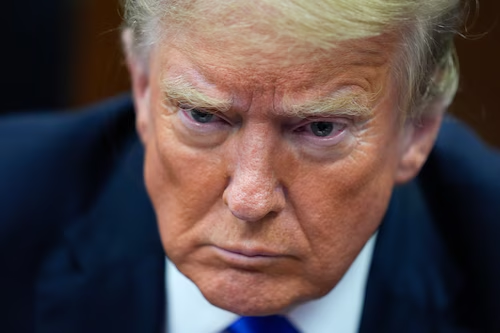In an unprecedented turn of events, former President Donald Trump has become the first commander-in-chief in American history to be convicted of a crime. His recent felony conviction in the New York hush money case has raised complex legal and constitutional questions, particularly regarding his eligibility to run for president again.
The Constitutional Criteria
The U.S. Constitution sets forth three primary requirements for presidential candidates: they must be a natural-born citizen, at least 35 years old, and a resident of the United States for at least 14 years. Notably, there is no explicit prohibition against convicted felons running for the nation’s highest office.
This constitutional silence has paved the way for several candidates with criminal records to mount presidential campaigns in the past. Notable examples include Eugene V. Debs, who ran for president in 1920 while imprisoned for sedition, and Lyndon LaRouche, who sought the presidency multiple times between 1976 and 2004 despite a felony conviction for tax and mail fraud conspiracy.
Trump’s Unprecedented Situation
While the Constitution does not categorically bar felons from seeking the presidency, Trump’s situation is unprecedented. He is the first former president to face criminal charges and the first to be convicted of a felony while actively campaigning for a return to the White House.
The charges against Trump span multiple jurisdictions, including federal cases related to his efforts to overturn the 2020 election results and his mishandling of classified documents. However, the case that has already resulted in a conviction is the New York hush money trial, where he was found guilty on 34 counts of falsifying business records to conceal payments to adult film star Stormy Daniels during the 2016 campaign.
Will Trump Go to Jail?
Despite his felony conviction, it is unlikely that Trump will serve a significant prison sentence, if any at all. The maximum sentence for the falsification of business records charges is 1-1/3 to four years in prison. However, defendants with no prior criminal history who are convicted solely of this offense rarely receive jail time in New York. Fines or probation are more common punishments.
Even if Trump is sentenced to prison, he could be released on bail while appealing the conviction, a process that could extend well beyond the 2024 election. As a former president, the logistics of incarcerating him and ensuring his safety could also prove challenging for authorities.
The Potential Impact on Trump’s Campaign
While Trump’s felony conviction does not legally disqualify him from running for president, it could have significant political implications for his campaign. Voters may question his character and fitness for office, potentially impacting his support in key battleground states.
Additionally, some states have laws that restrict voting rights for convicted felons, which could potentially impact Trump’s ability to cast a ballot for himself in certain jurisdictions. However, in his home state of Florida, where he is registered to vote, felons regain their voting rights upon release from prison, meaning Trump would likely retain his right to vote even if incarcerated.
Unprecedented Legal Terrain
Trump’s felony conviction and potential re-election bid have thrust the nation into uncharted legal territory. While the Constitution does not explicitly prohibit convicted felons from seeking the presidency, the framers likely did not envision a scenario where a former president would face criminal charges and potentially take office with a felony record.
As the legal proceedings unfold and Trump’s campaign progresses, the nation may witness a series of unprecedented legal battles and constitutional challenges. Ultimately, it will be up to the American electorate to decide whether a convicted felon is fit to hold the nation’s highest office.
